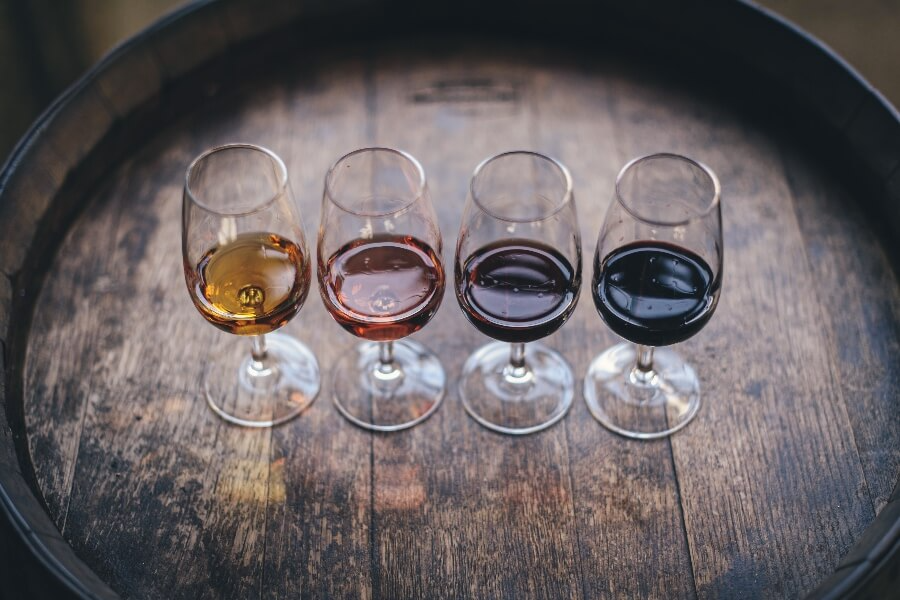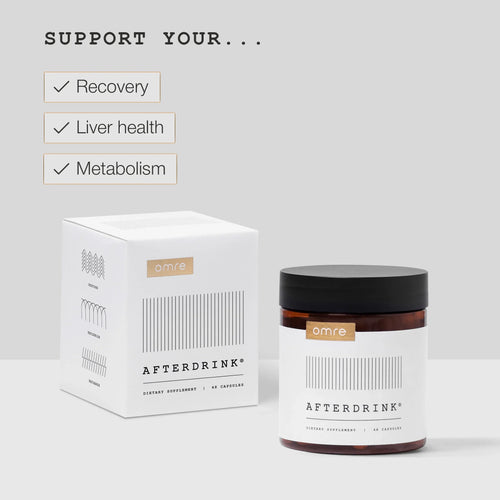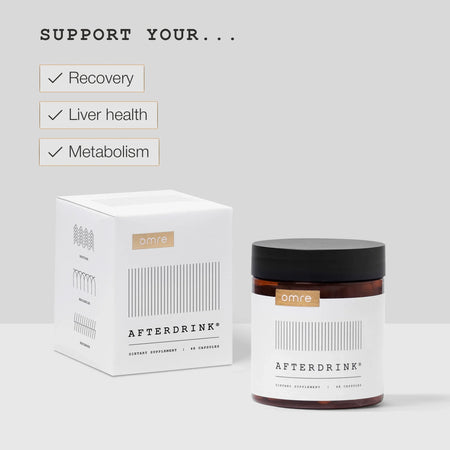Table of Contents
Wine hangovers are arguably the worst kind. If you’ve been unfortunate enough to experience one, you’ll know exactly how bad they can get.
Have you ever wondered why wine hangovers are particularly bad?
In this article, we’re going to look at all the reasons why wine causes the worst hangovers and everything you can do to get rid of it.
AFTERDRINK®
A supercharged antioxidant designed to support recovery, made from the very best, research-backed ingredients on the market.*
Does wine give you a hangover?
Yes, wine can give you a hangover. Wine hangovers may be severe due to compounds like congeners, sulfites, tannins, acetaldehyde, and quercetin, especially in red wine. These substances contribute to dehydration, inflammation, and impaired alcohol metabolism, worsening hangover symptoms.
Why are wine hangovers bad?
Wine hangovers are worse due to congeners, compounds like tannins, histamine, flavonoids, polyphenols, and sulfites formed during fermentation. Darker wines, especially red, have higher congener levels, triggering headaches, inflammation, and worsening symptoms, particularly for those sensitive to sulfites or histamine.
Hangovers are unpleasant, but wine hangovers have a reputation for being especially challenging. So, what makes them so intense?
Congeners are by-products formed during wine's fermentation and aging processes. While some contribute to the rich flavor and aroma of wine, they’re also culprits behind severe hangover symptoms.
These compounds are particularly concentrated in darker wines, such as red wine, making them more likely to cause intense hangovers. (1)
Here’s a breakdown of the main troublemaking congeners in wine:
Tannins
Responsible for the dry and bitter taste of wine and has been shown to be a trigger for wine headaches.
Histamine
Histamine is an organic compound with several physiological functions. For example, It’s an inflammatory mediator and responsible for the dilation of blood vessels and hives that develop in allergic reactions.(2)
Flavonoids and polyphenols:
These organic compounds have antioxidant properties, but they also lead to a buildup of phenols. Phenols are charged particles and react with other molecules which can lead to cellular inflammation.
Sulfites
sulfites are added to some wine to work as a preservative. Some people have sulfite intolerance and allergies.(2)
Why does wine cause bad headaches?
If congeners weren't enough, headaches after drinking wine can be especially bad. In particular, there's a strong relationship between migraines and wine. And there's a good amount of research-backed science which explains why:
Serotonin release (5-HT)
Red wine is a powerful releaser of serotonin from platelets. This is thought to be one of the reasons why wine headaches are so bad because serotonin regulates the sensitivity of pain receptors and blood flow to the brain.(3)
Dilation of blood vessels
Aside from serotonin, the dilation of blood vessels in the brain is also another commonly accepted theory for the cause of migraines.
As mentioned before, the release of histamine after drinking wine dilates blood vessels. Therefore, in addition to the release of serotonin, histamine is thought to play an important role in the relationship between wine and headaches.
Overall, red wine is a much more troublesome cause of headache compared to white wine because it naturally contains more histamine and stimulates the release of more serotonin.
How long does a wine hangover last?
A wine hangover typically lasts 24 hours but can extend up to 72 hours depending on the amount consumed, individual tolerance, hydration levels, and the wine’s composition. Proper hydration, rest, and consuming nutritious food can help reduce the duration and intensity of symptoms.
Factors that influence how long a wine hangover lasts
How long a hangover lasts depends on personal circumstances and how your body reacts to wine. Several factors, such as the quantity consumed, hydration levels, and your sensitivity to wine’s compounds, play a role in how long symptoms persist.
In most cases, common hangover symptoms like nausea, fatigue, and muscle aches subside within 24 hours. However, the situation changes when migraines are involved.
Wine-induced migraines
Unlike general hangover symptoms, wine-induced migraines can be more severe and last longer. Even a small amount of wine may trigger migraines in sensitive individuals, and these can persist for 3 to 5 days, making them particularly challenging to manage.
Which wine gives the least hangover?
Wines least likely to cause hangovers include:
- White wines: Lower in congeners compared to red wines.
- Rosé wines: Contain fewer congeners.
- Dry red wines: Lower alcohol content (12.5–13.5%) such as Tempranillo and Cabernet Sauvignon.
- Medium-bodied wines: Gentle on the body.
- Low-histamine wines: Examples include FitVine Wine Red Blend 2019.
Drink lighter wines, stay hydrated, and avoid binge-drinking to reduce hangover risks

Does using a wine filter reduce hangovers?
Wine filters usually remove sulfites and sediment. Some people have reactions to sulfite and in this specific case, it may be helpful.
However, when it comes to reducing hangover symptoms, wine filters are very unlikely to make a difference. That's because a filter is not able to remove all the other congeners.
But it's important for us to emphasize that the main cause of a hangover is too much alcohol! Sulfites and congeners are just additional things in wine that can make symptoms worse.
AFTERDRINK®
A supercharged antioxidant designed to support recovery, made from the very best, research-backed ingredients on the market.*
How to get rid of a wine hangover
When it comes to wine hangovers, prevention is always key. But if it’s too late for that and you’ve woken up with a hangover, there are a few things you can do to improve how you feel:
1) Proper hydration
Alcohol is a diuretic, which means it makes your kidneys produce more urine. In fact, every gram of alcohol makes you pee an extra 10mls. A glass of wine contains around 14 grams of alcohol. Therefore, every glass of wine makes you lose approximately 140ml of water.(4)(5)
A great way to rehydrate fast is with rehydration mixes. These contain a specific ratio of eletorytes and sugar which facilitate rapid hydration.
2) Painkillers
Over the counter painkillers like acetaminophen (paracetamol), aspirin, Ibuprofen, and low dose codeine are all potential options. These drugs all come with a long list of side effects and have the potential to interact with other medications. It's best to ask your pharmacist for advice before taking medications.
3) Sleep
By far your best way to get rid of a wine hangover is sleep and rest. Of course, this is only possible If you’re lucky enough to have the day off from work or able to hand over family responsibilities to a partner.
4) Ginger
Ginger is a natural anti-sickness remedy. It’s recommended by doctors for relief from morning sickness in pregnant women and it’s been shown in studies to work.(6)
Sipping on ginger tea is a great option if you like the taste!
5) Recovery supplements
Before we get into this segment, it's important to mention that the ingredients mentioned below have only been examined in small studies. From a scientific perspective, it is not proven that they have any benefit because a lot more research needs to be done first. It's always advisable to speak to your physician before trying new supplements.
With that said, a number of natural ingredients have been shown in studies to potentially reduce hangover severity via various mechanisms:
Things to avoid
Now that we’ve covered some simple wine hangover remedies, next up we’ll go over things you’ll probably want to avoid.
Coffee
Many people reach for a cup of coffee as their first drink in the hope it’ll cure their wine hangover. Unfortunately, coffee could do more harm than good.
Firstly, it’s a diuretic like alcohol. You’ll already be dehydrated and coffee will exacerbate this.
Secondly, it’s a stimulant which means it’ll increase your heart rate and exacerbate shakes.
Although caffeine will make you more alert and temporarily boost energy levels, there are pros and cons to consider.
Exercise
Ever heard of “sweating it out” as a wine hangover cure tactic? Well, it doesn’t work. By the time you've woken up with a hangover there’s nothing left to “sweat out”. Unfortunately, there's no scientific basis for sweating out "toxins".
More alcohol
Drinking more alcohol when hungover (AKA hair of the dog) might make you feel better in the short term. But it only delays the inevitable hangover which will come back with a vengeance.
Hard to digest food
Alcohol is a toxin that irritates your stomach lining. In addition, alcohol can increase stomach acid production and slow down gut motility.(11)
As a result, hard-to-digest food may not sit so well in the morning. These include foods such as meat (particularly red meat), salad, citrus fruits, and vegetables.
Sticking to carbohydrates like boiled potatoes or plain pasta may be a better choice.
How to prevent a wine hangover
Stick to lighter colored wine
We've mentioned congeners a few times in this article. Red wine is particularly heavy when it comes to congeners and lighter colored wine such as rose and white wine naturally contain a lot less.
Slow down and limit intake
Ultimately, the severity of your wine hangover is directly proportional to how much wine you’ve had to drink. So the best prevention tip is to drink less.
In addition, increasing the amount of time between each glass of wine can have a big impact. The reason is, slowing down will give your liver more time to process and eliminate the harmful by-products of alcohol metabolism.
Water
Drinking water between every glass of wine is a great way to rehydrate. You could also consider using rehydration mixes before you go to bed so that you mitigate some of the dehydration caused by alcohol.
Eat before you go out
Having a meal before or while drinking slows down alcohol absorption from your gut. Rapid peaks and troughs in blood alcohol concentrations wreak havoc on your insides which is what happens when drinking on an empty stomach.
Wine hangovers - Final words

That brings us to the end of our look into why wine hangovers are so bad.
We’ve walked you through the avialble science and research, as well as tips on how to prevent and get rid of a wine hangover.
Sticking to the basics by keeping well hydrated, having a meal before going out, and reducing your wine intake is key to preventing the worst hangovers.





